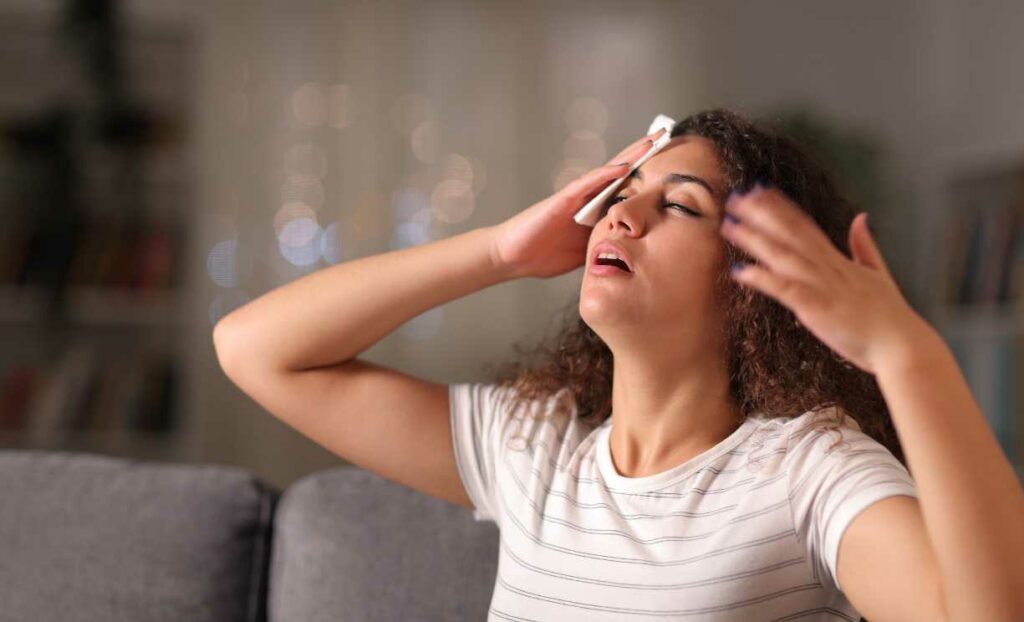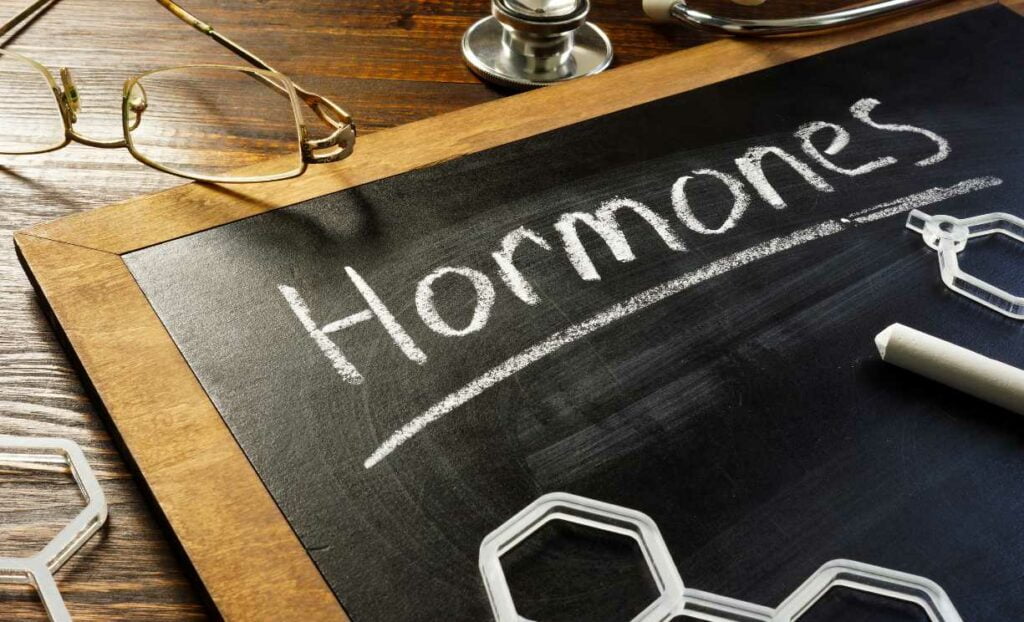Menopause, a natural phase marking the end of a woman’s reproductive years, brings with it a series of hormonal changes that can disrupt the tranquility of the night. Among the common and often challenging symptoms is night sweats. These nocturnal episodes of excessive sweating can lead to restless nights and weary mornings. In this blog, we’ll explore effective treatments tailored specifically to manage night sweats treatment during menopause, offering a beacon of hope for a more peaceful sleep.
Contents
Understanding Menopausal Night Sweats
Menopausal night sweats are a common and often disruptive symptom of menopause, affecting many women undergoing this natural life transition. These episodes involve sudden and intense sweating during sleep, primarily attributed to hormonal changes, especially the decline in estrogen levels. As estrogen regulates body temperature, its decrease can lead to a confused thermostat, causing the body to overheat and trigger night sweats.
These sweats can result in soaked sleepwear and disturbed sleep, impacting a woman’s overall well-being. While each woman’s experience is unique, effective treatments for menopausal night sweats include hormone replacement therapy (HRT), cooling bedding and sleepwear, lifestyle adjustments, and relaxation techniques. Managing triggers like spicy foods and caffeine, staying hydrated, and consulting with healthcare providers for personalized guidance are integral to addressing this menopausal symptom and restoring restful sleep.
How Long Do Night Sweats Last During Menopause?
The duration of night sweats during menopause varies for each woman. For some, night sweats may last for a few months, while others may experience them for several years. Typically, they are most intense during the early stages of menopause and gradually decrease over time. However, individual factors such as genetics, lifestyle, and overall health can influence the duration and severity of night sweats.
While some women find relief relatively quickly, others may continue to experience occasional night sweats even after completing the menopausal transition. If you’re concerned about the duration of your night sweats or if they significantly impact your sleep and well-being, consulting with a healthcare provider can provide personalized insights and guidance tailored to your specific situation.
Causes Of Night Sweats
Night sweats in women can be attributed to various factors, and understanding these causes is crucial for effective management. Here are some common reasons why women may experience night sweats:
- Hormonal Changes: Hormonal fluctuations, particularly a decline in estrogen levels, are a primary cause of night sweats in women. This often occurs during menopause, leading to disruptions in the body’s temperature regulation.
- Menopause: Menopause is a significant life stage for women, typically occurring in their late 40s or early 50s. Night sweats are a common symptom during this transition, linked to hormonal shifts that affect the body’s ability to control temperature.
- Pregnancy: Hormonal changes during pregnancy can also lead to night sweats. Increased blood flow and metabolic rate, along with changes in hormone levels, contribute to episodes of excessive sweating, especially during the later stages of pregnancy.
- Infections: Certain infections, such as tuberculosis or endocarditis, can cause night sweats. When the body is fighting an infection, it may respond with fever and sweating, often more pronounced during the night.
- Medications: Some medications, including certain antidepressants, hormone therapies, and medications for diabetes, can have night sweats as a side effect.
- Hyperhidrosis: Hyperhidrosis is a condition characterized by excessive sweating not necessarily linked to heat or physical activity. It can contribute to night sweats and may have various underlying causes.
- Cancer: Certain cancers, particularly lymphoma, can cause night sweats. The body’s response to cancer cells can lead to fever and sweating, often more noticeable during the night.
- Thyroid Issues: Disorders affecting the thyroid gland, such as hyperthyroidism, can disrupt the body’s temperature regulation and contribute to night sweats.
- Anxiety and Stress: Emotional factors, including anxiety and stress, can trigger night sweats. The body’s response to stress can lead to increased heart rate and changes in body temperature.
When To See A Doctor?
Treatment Of Menopause Related Night Sweats
Menopause-related night sweats treatment involves a combination of lifestyle adjustments, behavioral changes, and, in some cases, medical interventions. Here are effective treatments for alleviating menopause-related night sweats:
- Hormone Replacement Therapy (HRT): HRT is a common and effective treatment for menopausal symptoms, including night sweats. Estrogen therapy helps balance hormonal levels, reducing the frequency and intensity of sweats. However, the decision to use HRT should be made in consultation with a healthcare provider, considering individual health risks and benefits.
- Cooling Bedding and Sleepwear: Invest in bedding and sleepwear designed to wick away moisture and regulate body temperature. Materials like moisture-wicking fabrics or breathable cotton can provide a cooler sleep environment, reducing the discomfort of night sweats.
- Layered Bedding and Temperature Control: Use layered bedding that allows easy adjustment based on your body’s temperature needs. Regulate the bedroom temperature by using a fan or adjusting the thermostat to create a cool sleep environment.
- Mind-Body Techniques: Practice relaxation techniques before bedtime, such as deep breathing, meditation, or yoga. Managing stress can contribute to better sleep quality and potentially reduce the frequency of night sweats.
- Prescription Medications: In cases where night sweats significantly impact sleep quality, healthcare providers may prescribe medications such as low-dose antidepressants, antiperspirants, or medications specifically designed to address excessive sweating.
- Cognitive Behavioral Therapy for Insomnia (CBT-I): CBT-I is a structured program designed to address insomnia and improve sleep quality. It can be effective in managing sleep disturbances, including those related to menopause.
- Herbal Supplements: Certain herbal supplements, such as black cohosh and evening primrose oil, have been explored for their potential to alleviate menopausal symptoms. Consult with a healthcare provider before incorporating these supplements.
Home Remedies For Menopausal Night Sweats
Managing menopausal night sweats at home involves adopting lifestyle changes and incorporating natural remedies to alleviate symptoms. Here are some home remedies that may help relieve menopausal night sweats:
- Stay Hydrated: While reducing fluid intake close to bedtime can minimize excessive urination, staying well-hydrated throughout the day is essential for overall health. Opt for water or herbal teas.
- Limit Caffeine and Alcohol: Reduce the intake of caffeine and alcohol, as these can contribute to dehydration and exacerbate night sweats. Opt for decaffeinated alternatives and moderate alcohol consumption.
- Exercise Regularly: Engage in regular physical activity to promote overall health and well-being. Exercise can help regulate hormones, improve mood, and contribute to better sleep.
- Herbal Teas: Certain herbal teas, such as sage or black cohosh tea, may have mild cooling effects and be soothing. However, it’s advisable to consult with a healthcare provider before incorporating herbal supplements.
- Flaxseed: Flaxseed contains lignans, which may have estrogen-like effects that can help regulate hormonal imbalances. Consider adding ground flaxseed to your diet or talk to a healthcare provider about supplementation.
- Healthy Diet: Adopt a balanced and nutritious diet rich in fruits, vegetables, whole grains, and lean proteins. Avoid spicy foods, which can contribute to body heat and exacerbate night sweats.
- Aromatherapy: Some women find relief through aromatherapy using essential oils like lavender or peppermint. Use a diffuser or add a few drops to a tissue placed near your pillow.
Conclusion
In conclusion, the night sweats treatment involves a combination of personalized approaches and a commitment to holistic well-being. From investing in cooling bedding to exploring hormone replacement therapy and embracing lifestyle adjustments, there is a spectrum of treatments available. Each woman’s experience is unique, and finding the right combination may require some trial and error. The key lies in proactive communication with healthcare professionals, understanding individual triggers, and implementing a multifaceted strategy that considers both physical and emotional aspects.





